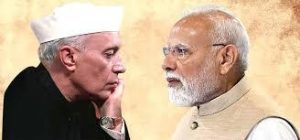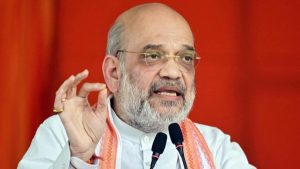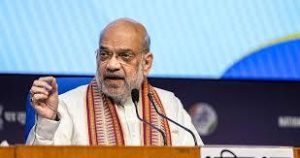New Delhi – Union Home Minister Amit Shah has made striking comments about India’s diplomatic approach, stating that the Amit Shah foreign policy perspective reveals how Prime Minister Narendra Modi “has been given a spine” to India’s international relations, which previously lacked strength. These remarks came during an interview marking PM Modi’s 75th birthday, where Shah drew sharp contrasts between current and previous leadership approaches.
The Amit Shah foreign policy assessment suggests a fundamental transformation in India’s international stance under the current BJP-led NDA government. Shah emphasized that when historians evaluate different Prime Ministers, they will find that “the biggest achievements have been under PM Modi’s tenure,” positioning the current administration as historically superior to its predecessors.
Direct Modi-Nehru Comparison on Leadership Effectiveness


When specifically asked to compare Jawaharlal Nehru, India’s first and longest-serving Prime Minister, with Narendra Modi, whose continuous 11-year tenure represents the second-longest prime ministerial term, the Amit Shah foreign policy critique became more pointed. Shah argued that previous diplomatic approaches gave “undue precedence” to diplomacy over security considerations.
The Amit Shah foreign policy framework contrasts sharply with historical approaches, particularly regarding how India responded to security threats. Shah emphasized that under Modi’s leadership since 2014, the government has fundamentally altered the traditional balance between diplomatic engagement and security responses, prioritizing decisive action over extended negotiations.
Aggressive Response to Pakistan Terror Attacks

According to the Amit Shah foreign policy doctrine, the current government has established a new paradigm for responding to terrorist attacks from Pakistan. “Whenever Pakistan carried out a terror attack… we prepared a reply with not a minute’s delay, and delivered a befitting retaliation within a month,” Shah stated, highlighting the government’s commitment to immediate and decisive responses.
This Amit Shah foreign policy approach represents a significant departure from previous administrations’ responses to cross-border terrorism. The Home Minister emphasized that “Indians’ blood cannot be spilled any longer — we have made that amply clear,” indicating a zero-tolerance stance toward terrorist activities and a commitment to swift retaliatory measures.
Modi’s Evolution and Political Journey
The Amit Shah foreign policy praise extends beyond diplomatic achievements to encompass Modi’s entire political evolution. Shah, who has worked closely with Modi for decades, described witnessing the Prime Minister’s transformation “from being a party worker at the local level to becoming a national leader of BJP, to then becoming CM of Gujarat, and then PM.”
Having observed Modi’s career trajectory firsthand, Shah’s Amit Shah foreign policy endorsement carries particular weight given their shared Gujarat origins and overlapping political careers spanning approximately two decades. Shah noted that he has “had the good fortune of seeing how Modi has worked diligently — always widening his vision as per the role.”
Also Read: Bihar CM Nitish Kumar Announces 125 Units Free Electricity Before Polls
Leadership Style and Work Ethic Assessment


The Amit Shah foreign policy commentary includes personal observations about Modi’s dedication and work ethic. Shah claimed that Modi “has been the longest-serving, when it comes to being a prime minister and a chief minister” and noted that he has “seen only one person who hasn’t taken a holiday in the last 24 years.”
These personal anecdotes support the broader Amit Shah foreign policy narrative that positions Modi as an exceptional leader whose commitment exceeds that of his predecessors. Shah’s intimate knowledge of Modi’s working style, gained through their long political association, lends credibility to his assessments of the Prime Minister’s achievements.
Global Popularity and International Standing
The Amit Shah foreign policy evaluation includes claims about international recognition, stating that “India and the world believes PM Modi is the most popular prime minister so far.” This assertion attempts to provide external validation for the government’s diplomatic achievements and Modi’s personal standing on the global stage.
Such Amit Shah foreign policy statements reflect the government’s emphasis on projecting strength and popularity both domestically and internationally, contrasting with what they characterize as weaker previous approaches to international relations.
Political Partnership and Shared Vision
Shah’s position as the “second most powerful politician in the ruling BJP-led NDA after Modi” gives particular significance to his Amit Shah foreign policy statements. Their political partnership began when Shah served as home minister in the Gujarat state government during Modi’s tenure as Chief Minister in the early 2000s.
The Amit Shah foreign policy perspective thus emerges from years of collaboration and shared governance experience. Shah moved to the national political scene alongside Modi, serving as BJP’s national president before assuming his current ministerial role, providing him with comprehensive insight into Modi’s leadership evolution.
Historical Context and Legacy Implications
The Amit Shah foreign policy critique ultimately serves to establish a historical narrative that positions the current government as transformative compared to previous administrations. By characterizing earlier diplomatic approaches as lacking “spine,” Shah attempts to create a clear distinction between Modi’s assertive leadership and what he portrays as weaker predecessors.
This Amit Shah foreign policy framework represents more than diplomatic analysis; it constitutes a political argument about leadership effectiveness and national strength that the BJP hopes will resonate with voters and cement Modi’s historical legacy as a decisive, transformational leader who fundamentally altered India’s international standing.

